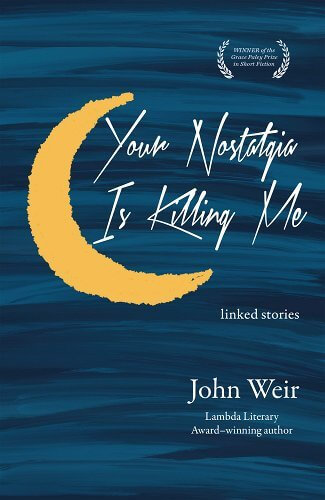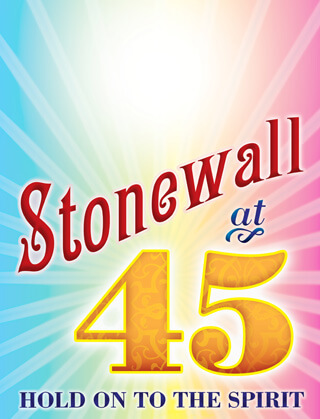John Weir’s “Your Nostalgia Is Killing Me,” alternately identified as “Short Stories” and “Linked Stories” — 11 in all — is wise, often funny, and poignant yet unsentimental testimony from a narrator named John Weir, whose formative life experiences were his bullying as a youth and the death of “half the people I knew when I was twenty-five” during the worst days of New York’s AIDS epidemic.
The book has, of course, unmistakable qualities of a memoir. Like author Weir, the narrator is a gay man now in his early 60s, a writer who teaches college in Queens, and an ACT UP and Queer Nation activist. The stories include an AIDS activist’s 1993 East Village political funeral that I attended and a 2013 protest outside the Russian Consulate on the Upper East Side that I covered as a reporter. At least one of the central characters, who appears in numerous of the stories, is an identifiable real-life person — Dave, a gay writer who grabbed wide attention with acerbically funny novels about life as an HIV-positive gay man before dying from AIDS-related causes in 1994. One story recounts a presumably true and harrowing scene of Dave and the narrator in the office of literary agent Charlotte Sheedy.
At the same time, Weir makes clear in several stories that they should not be read as documentary truth.
“I have changed names and events and consequences, such as how we really met, and where it all took place, and who was in control of whom,” Weir writes, in chronicling a misbegotten affair with Phil, an acting class scene partner who might be bisexual or perhaps is straight.
“I remember what suits me,” Weir quotes, at the book’s outset, from the Anthony Mann film “The Naked Spur,” and in his confession about changing up the details of the affair with Phil the narrator, says, “Not a bit of the truth that I have suppressed casts me in a favorable light.”
But self-interest seems far less at play here than the simple demands of good storytelling and discretion about men who are still around to read this book.

How else can we account for the narrator’s revelation, “It crossed my mind, thinking of all the assholes I’d been in love with, not the ones who had loved me but the ones I felt I couldn’t live without… that maybe the asshole was me?”
Or this admission of an unflattering trait he shares with his mother?: “[She had] an instinctive grasp of whatever you like least about yourself, and great skill in using it against you…I share that intuitive knack for knowing, without being told, what hurts you the most. To exhaust that skill, I use it against myself, a narcissistic deployment.”
The narrator locates his narcissism as an outgrowth of persistent, nearly universal bullying he suffered at the hands of schoolmates at a young age. Those experiences taught him that he was a “faggot” years before a yearning encounter with a golden boy showed him he was gay.
“My shame and narcissism: it was painful, and it was all about me,” he writes.
The narrator was silent about his shame for nearly a decade after high school, until a boyfriend’s slap ends his emotional blackout. During a wordless anonymous sexual encounter in a Queens “porno palace” — neither he nor his Latino partner, Rico, spoke the other’s language — he concedes that his sexual urges are motivated less by desire than by envy.
“I’m gay because I hate, not women, but men. I’m terrified of them,” the narrator says. “I don’t want to touch them. I want to be them.”
But he also wants to be acknowledged, perhaps to escape the victimhood of his youth.
“I want to be seen, and I have a compulsive need to confide and reveal … and to get control by giving myself away,” the narrator writes in a story that jumps back between his on again, off again affair with a pop singer/composer and his fling with scene partner Phil.
The romances chronicled in these 11 stories are all misfires of a sort, doomed because of the narrator’s inability or unwillingness to communicate what he is looking for any better than he could in the porno palace. He comes to admit the truth of his pop star boyfriend’s assessment: “Marc’s right. I’m trapped in high school gym class, forever looking for men who will make me feel like the gay one.”
Yet he also discovers he can trade roles from one relationship to another, writing of Phil, “I was his Marc. I am always either Marc or me, relentlessly seeking or unhappily sought.”
Years later, in a relationship with an HIV-positive man who shares much of his history of activism and loss, the narrator makes a determined yet ultimately futile attempt to maintain a connection and change his life.
“We were going to figure out how to be intimate in an epidemic if the epidemic was not HIV but masculinity in America,” he writes, of a chance that eludes him.
Central to this collection is the dying and death of novelist Dave, the bulk of whose story is told in “Scenes from a Marriage” and “It Must Be Swell to Be Laying Out Dead.”
“His dying wasted five years of our friendship, and I lost him in retrospect,” the narrator writes of Dave’s grisly disintegration.
There was no marriage here — John and Dave were never lovers. Were they even best friends?
“He’s the center of my life, that’s all,” the narrator says.
The 21st century wave of nostalgia for the heyday of AIDS activism — which the narrator considers whitewashing — surely evokes crippling memories of Dave.
“I was forbidden to mention his death, and then he died,” the narrator writes. “It was the most painful thing that ever happened to me.”
Later he adds, “I wish people would never ask about him. I wish they would never say his name.”
Weir writes beautifully, and his wit, his keenly detailed observations, and his telling insights will resonate — at the very least for gay men of the generation we share. His ruminations about that untamed epidemic our world continues to face — unreconstructed masculinity — could hardly be more timely.
YOUR NOSTALGIA IS KILLING ME | By John Weir | Red Hen Press | $16.95 | 223 pages



































